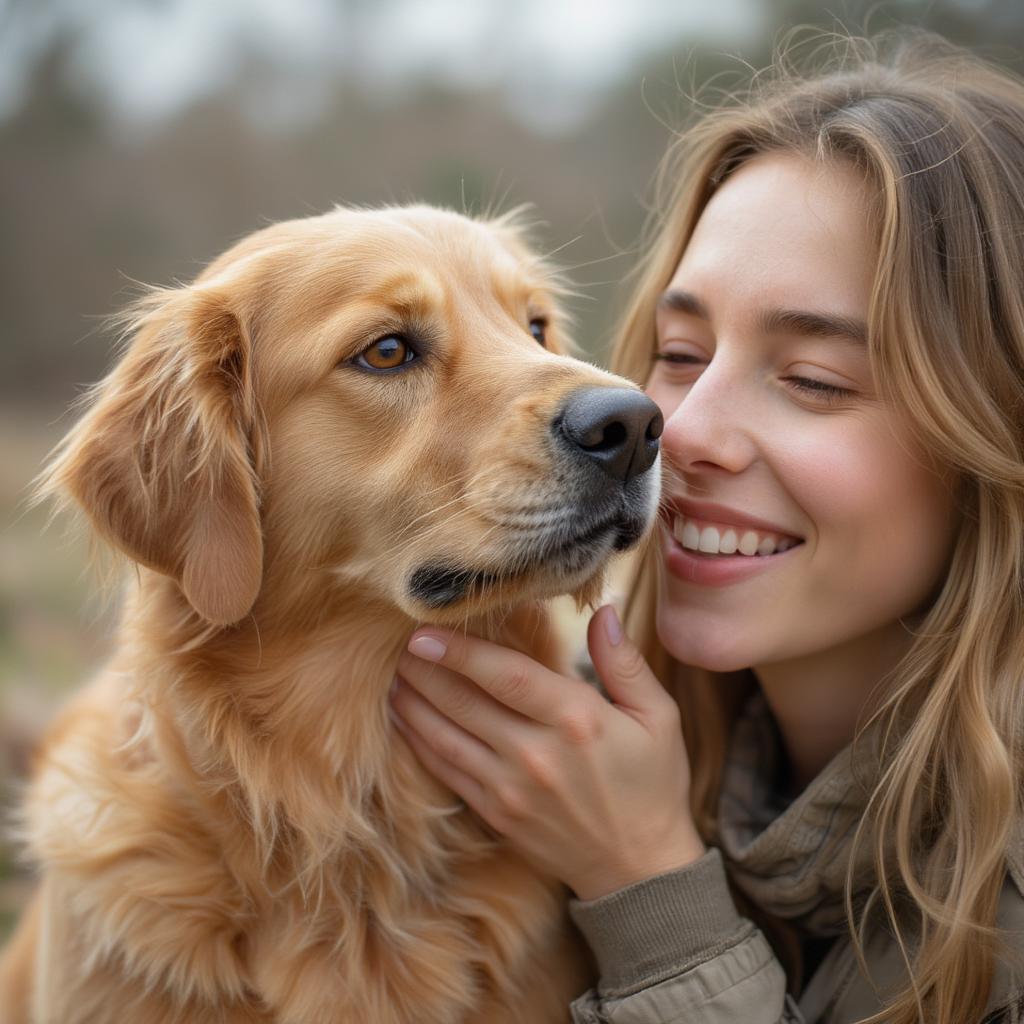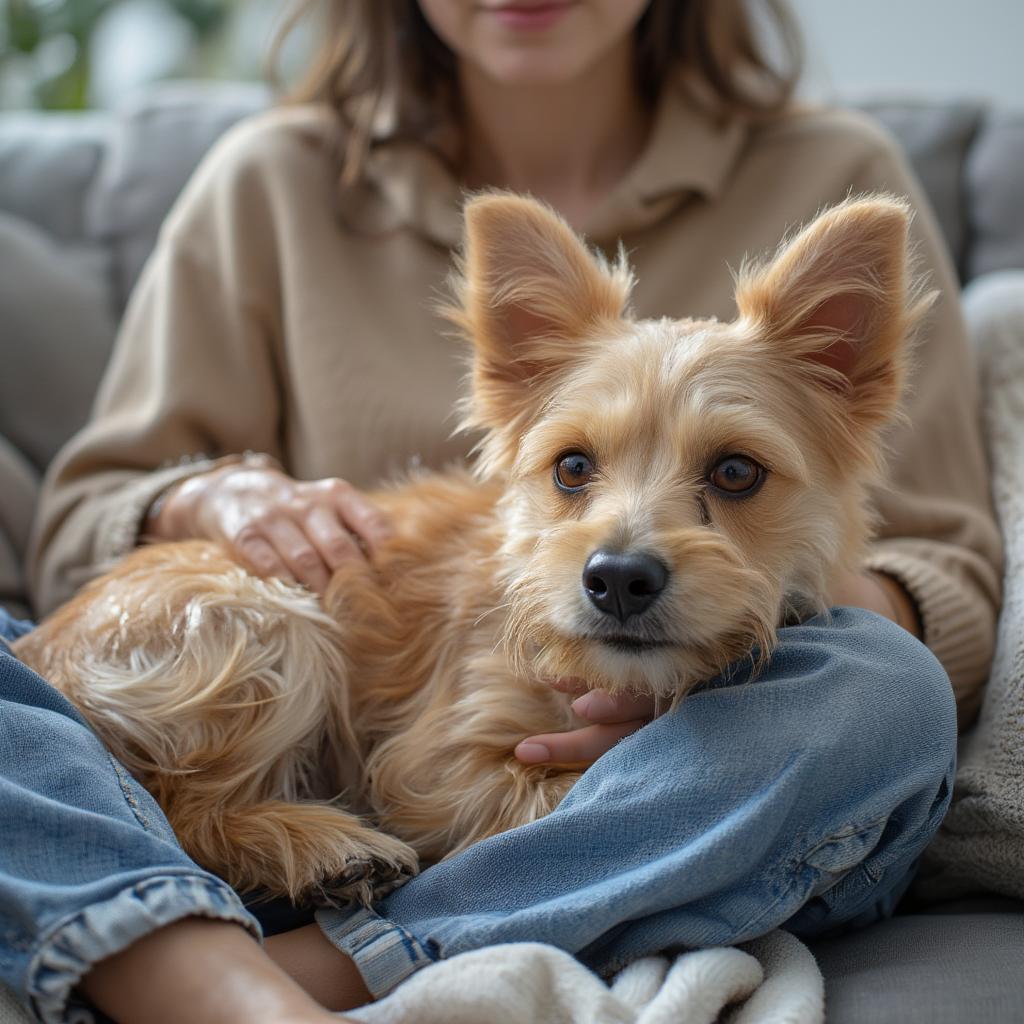Can Dogs Fall In Love? It’s a question that has captivated dog owners and animal lovers for generations. While our furry companions certainly demonstrate affection, loyalty, and deep bonds with their human and canine companions, the nature of their emotions remains a complex and often debated topic. This article delves into the science behind canine behavior, exploring the fascinating question of whether dogs experience love as we understand it.
Decoding Canine Affection: Do Dogs Feel Love?
Understanding whether dogs can fall in love starts with examining how they express affection. Dogs exhibit a range of behaviors that suggest strong emotional connections, including tail wags, enthusiastic greetings, playful interactions, and even protective instincts. These actions often mirror human expressions of love, leading many to believe that dogs experience a similar emotion. However, scientific understanding of animal emotions is constantly evolving.  Dog showing affection by licking owner's face.
Dog showing affection by licking owner's face.
The Role of Hormones and Brain Chemistry
Science offers intriguing insights into the biological basis of canine affection. Studies have shown that when dogs interact with their loved ones, their brains release oxytocin, often referred to as the “love hormone.” This same hormone plays a crucial role in human bonding and attachment. This hormonal response suggests that dogs experience a positive emotional state when interacting with their human families or other dog companions, further supporting the idea that they are capable of forming deep emotional bonds. Do you know what your dog’s favorite smells are? Find out here: what smells do dogs love.
How Dogs Express Their Love: Signs to Watch For
While dogs can’t verbalize their emotions, they communicate their love through a rich repertoire of behaviors. Recognizing these signs can help us understand the depth of our connection with our canine companions. These include physical affection such as licking, cuddling, and leaning, as well as enthusiastic greetings, tail wags, playful bows, and maintaining eye contact. Even seemingly simple actions like following you around the house or sleeping near you can be expressions of their love and attachment.  Dog cuddling with owner on a sofa, showing affection.
Dog cuddling with owner on a sofa, showing affection.
Can Dogs Fall in Love With Other Dogs?
Can dogs fall in love with other dogs? Absolutely. Dogs often form strong attachments to other dogs, especially those they live with. These bonds can involve playful interactions, shared naps, mutual grooming, and even displays of protective behavior. While the nature of these relationships might differ from human romantic love, they demonstrate the capacity of dogs to form deep and meaningful connections with other members of their species. If you’re a cat lover as well, check out this guide on building a bond with your feline friend: how to get a cat to love you.
The Science of Canine Attachment: A Deeper Dive
Scientific research continues to explore the complexities of canine emotions. Studies using brain imaging techniques like fMRI have revealed that dogs’ brains show similar activity patterns to humans when exposed to stimuli associated with loved ones. This further supports the notion that dogs experience a form of love, albeit one that might be expressed differently than human love.
“Dogs possess a remarkable capacity for empathy and emotional connection,” says Dr. Emily Carter, a renowned animal behaviorist. “Their ability to form deep bonds with both humans and other dogs is a testament to their complex emotional lives.”
Do Dogs Experience Romantic Love?
While dogs certainly form deep attachments, the concept of “romantic love” as we understand it might not fully apply to them. Their bonds are likely driven by a combination of factors, including social needs, companionship, and the positive reinforcement they receive from interactions with loved ones.
“Dogs prioritize social connection and belonging,” adds Dr. Carter. “Their love is expressed through loyalty, trust, and a deep desire for companionship.”
Conclusion
Can dogs fall in love? While the scientific community continues to explore the intricacies of animal emotions, the evidence suggests that dogs experience a form of love, characterized by strong attachment, loyalty, and deep emotional bonds. Their expressions of affection, coupled with the hormonal and neurological responses observed in studies, paint a compelling picture of their capacity for love and connection. While it might not be identical to human romantic love, the love of a dog is undoubtedly a powerful and enriching force. Remember, a good night’s sleep is essential for both you and your furry friend! Learn more about the importance of sleep: why do i love to sleep. For those interested in specific breeds and their needs, explore articles like this one on Huskies: do huskies love the cold.
FAQ
- How can I tell if my dog loves me?
- Do dogs experience heartbreak?
- Can dogs fall in love with more than one person?
- Do different breeds express love differently?
- How does a dog’s love differ from a cat’s love?
- Can dogs sense when their owners are sad?
- How can I strengthen my bond with my dog?
Need further assistance? Contact us at contact@daiduongtranhba.com or visit our office at Michigan Ave, Suite 3100, Chicago, IL 60611, USA. Our customer care team is available 24/7.

